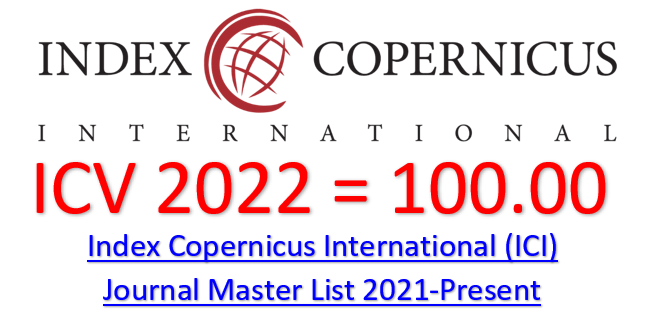The Relationship Between Parental Verbal Abuse Behavior and Psychosocial Development of School-Age Children
DOI:
https://doi.org/10.55018/janh.v5i1.133Keywords:
Verbal Abuse, Psychosocial development, childrenAbstract
Background: One of the problem phenomena that still occurs in school-age children is verbal abuse, violence that harms children physically and verbally. Children who get verbal abuse will generally imitate the same things they receive from their parents. This research aimed to analyze the correlation between parental verbal abuse behavior and psychosocial development in school-age children.
Method: This research used a correlational design with a cross-sectional approach. The research population was 40 school-age children (11-12 years) at MI Miftahul Huda Jatisari, with a sample of 36 respondents obtained from a purposive sampling technique. Data collection of independent variable Korean Verbal Abuse Questionnaire (K-VAQ) modification and dependent variables of children's psychosocial development used questionnaires.
Results: almost (69.4%) received severe verbal abuse, and most (63.9%) had poor psychosocial development. The statistical test results used Spearman Rho obtained a p-value of 0.013 (p-value < α), then H1 was accepted with R = 0.408, which means the strength of the relations. The correlation coefficient was positive, including a direct correlation, meaning that the more severe verbal abuse parents increasingly lacked psychosocial development of children.
Conclusion: Psychosocial development of children is influenced by factors from parents' behavior in educating children. Parents' mistakes in responding to mistakes by scolding/blaming children can cause children to feel ashamed and worthless. It is hoped that parents should not verbally abuse children because it will lead children to behavior that inhibits or harms the child themselves.
Downloads
References
Al Adawiah, R. (2015). Upaya Pencegahan Kekerasan Terhadap Anak.Jurnal Keamanan Nasional, 1(2), 279-296
Arifah, Y., Saparwati, M., & Purwaningsih, H. (2020). Hubungan Dukungan Orang Tua dengan Perkembangan Psikososial Anak Usia Sekolah di SDN karangjati 02 (Doctoral dissertation, Universitas Ngudi Walyo).
Armiyanti, I., Aini, K., & Apriana, R. (2018). Pengalaman Verbal Abuse oleh Keluarga pada Anak Usia Sekolah di kota semarang. Jurnal Keperawatan Soedirman, 12(1), 12-20.
Astuti, E. S., & Warastuti, W. (2014). Pengaruh Stimulasi Motorik Halus Terhadap Daya Konsentrasi Belajar Anak Usia Prasekolah. Jurnal Ilmu Pendidikan, 20(2).
Dian Ika Aryani, N. I. (2021). Kekerasan Terhadap Anak; Strategi Pencegahan dan. istighna, Vol. 4, No 2, Juli 2021 P-ISSN 1979- 2824 E-ISSN 2655-8459, 4, 177- 189. Retrieved from http://e- journal.stit-islamic- village.ac.id/index.php/istighna
Diana Mutiah, ( 2012). Psikologi Bermain Anak Usia Dini. Jakarta: Prenada Media Group
Farhan, Z., Suharta, D., & Ratnasari, D. (2018). Faktor-faktor yang Melatarbelakangi Orang Tua Melakukan Verbal Abuse pada Anak Usia Sekolah 6-12 tahun di Kabupaten Garut. Jurnal Keperawatan Malang, 3(2), 101-108.
Gunarsa, S. D., & Gunarsa, Y. S. D. (2010). Psikologi Perkembangan Anak & Remaja. Jakarta: Gunung Mulia.
Hidayat Alimul, A. (2012). Riset Keperawatan dan Tekhnik Penulisan Ilmiah. Salemba Media : Jakarta.
Indrayati, N., Iqomah, M. K. B., & Fahdiyah, H. (2021). Penerapan Komunikasi Efektif Orang Tua untuk Pencegahan Kekerasan Verbal pada Anak. Jurnal Dikemas Kendal, 1(1), 5-12.
Iriani Indri Hapsari, (2017). Psikologi Perkembangan Anak. Jakarta: Penerbit Indeks
Jahja, Y. (2011). Psikologi Aerkembangan. Jakarta: Kencana.
Jeong, B., Lee, S. W., Lee, J. S., Yoo, J. H.,Kim, K. W., Cho, S., & Choi,J. (2015). The psychometric properties of the Korean version of the verbal abuse questionnaire in university students. Psychiatry investigation, 12(2), 190. JP radar kediri, (2020) Retrieved from https://radarkediri.jawapos.com/ hukum- kriminal/22/07/2020/ratusan- anak-di-jatim-jadi-korban- kekerasan Jurnal Psikologi Undip Vol.14 No.1 April 2015, 8.-9. (2015). Faktor-Faktor yang Berhubungan dengan Perilaku Orang Tua dalam Melakukan Kekerasan Verbal. Yuni Fitriana, Kurniasari Pratiwi, Andina Vita Sutanto, 14, 81-93.
Keliat, B. A. (2011). Manajemen Keperawatan Psikososial & Kader Kesehatan jiwa. Jakarta.EGC.
Khasanah, U. A., Livana, P. H., & Indrayati, N. (2019). Hubungan Perkembangan Psikososial dengan Prestasi Belajar Anak Usia Sekolah. Jurnal Ilmu Keperawatan Jiwa, 2(3), 157- 162.
KOMINFO JATIM. (2020). Retrieved from https://www.kominfo.go.id/cont ent/detail/6758/menteri-yohana- deklarasi-kampanye-anti- kekerasan-anak/0/sorotan_media
KPPPRI. (2021). Sistem Informasi Online Perlidungan Perempuan dan Anak (SIMFONIPPA). Retrieved from https://kekerasan.kemenpppa.go. id/
Kuspartianingsih, S. (2012). Hubungan antara Verbal Abuse Orang Tua dengan Perilaku Agresif pada Remaja Agresif di Sekolah Menengah Pertama Negeri 129 Jakarta Tahun 2012. (28-Jan- 2015). Retrieved from http://repository.uinjkt.ac.id/dsp ace/handle/123456789/25668
Lestari, Titik. (2015). Kumpulan Teori untuk Kajian Pustaka Penelitian Kesehatan. Yogyakarta: Nuha Medika
Livana, P. H., Ramli, M., & Radjah, C. L. (2021). Is There A Relationship Between the Physical and Verbal Abuse of Parents and the Psychosocial Development of School-Aged Children?. Jurnal Ilmu Keperawatan Jiwa, 4(2), 201-214.
Lutfiyati, A., & Kristiana, E. F. (2019). Hubungan Verbal Abuse oleh Orang Tua dengan Prestasi Belajar siswa di SMPN 2 Sedayu Bantul Yogyakarta.
Mahmud, B. (2020). Kekerasan Verbal pada Anak. AN-NISA: Jurnal Studi Gender Dan Anak, 12(2), 689-694.
Maknun, L. L. (2017). Kekerasan Terhadap Anak yang Dilakukan oleh Orang Tua (Child Abuse). Muallimuna, 3(1), 66-77.
Moleong, L. J. (2011). Metodologi Penelitian Kualitatif, cetakan XXIX. Bandung: PT. Remaja, Rosdakarya.
Muhith, A., Nasir, A., & Ideputri, M. E. (2011). Buku ajar: Metodologi Penelitian Kesehatan. jakarta
Muna’amah, M. A. (2019). Konseling Individual untuk Meningkatkan Motivasi Belajar Anak Masa Pertengahan di Kampung Gunung Batur 2 Desa Mekarsari Kecamatan Pulomerak Kota Cilegon (Doctoral dissertation, UNIVERSITAS ISLAM NEGERI SERANG BANTEN).
Nasir, Abdul dan Muhith, Abdul, (2011). Dasar-Dasar Keperawatan Jiwa. Jakarta:Salemba Medika
Nasution, A. H. (2017). Perkembangan Psikososial Anak Usia Sekolah di SDN 060922 Kelurahan Tanjung Rejo Kecamatan Medan Sunggal.
Newswire. (2020). “WHO: Sekitar 1 Miliar Anak di Dunia Alami Kekerasan Setiap Tahunnya. “Retrieved from https://kabar24.bisnis.com/read/ 20200619/79/1254847/who-
Sekitar-1-miliar-anak-di-dunia- alami-kekerasan-setiap-tahunnya
Nirwana, A. B. (2011). Psikologi ibu, Bayi dan Anak. Jakarta
Notoatmodjo, S. (2012). Metodologi Penelitian Kesehatan.; jakarta
Nursalam, M. (2015). Metodologi Penelitian Ilmu Keperawatan Edisi ke- 4. Jakarta: Penerbit Salemba Medika.
Putri, A. M., & Santoso, A. (2012). Persepsi orang tua tentang kekerasan verbal pada anak. Jurnal Keperawatan Diponegoro, 1(1), 22-29.
Radja, R. D. (2016). Gambaran kekerasan pada anak sekolah dasar. Jurnal e-Clinic (eCl), Volume 4, Nomor 2, Juli-Desember 2016, 4.
Downloads
Published
How to Cite
Issue
Section
License

This work is licensed under a Creative Commons Attribution-ShareAlike 4.0 International License.

























